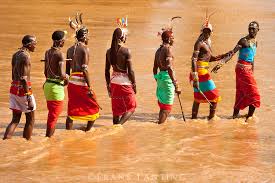Last weekend, I was invited to spend a few days in Maralal. The spelling is MaraLAL, and not MaraRAL, as would be kinder on the tongue. I consider visiting a place like that a once in a lifetime opportunity because even though Maralal is about 350 km from Nairobi, it’s not exactly the kind of place that you can go for a weekend barbecue. It’s not the kind of place you go to unless you have serious business there or you are one of those die hard tourists determined to go off the beaten path. And off the beaten path it is.
Nonetheless, Maralal is beautiful. And it is a special kind of place. The kind of Kenya we hear about on the news but can hardly conceptualize. The kind of place that foreign film crews visit to make a slice of ‘Africa’ documentaries that irritate urban Africans with digital tv. The kind of place where little girls and boys don’t swat at the flies covering their eyes and noses. The kind of place where brightly dressed morans saunter into town without anyone batting an eye.
Heading to Maralal is cutting a line right up to Kenya’s center. From Nairobi, you drive upwards to the rift valley. Past the donkeys in Limuru and the mysterious plantations in Kijabe. Past the hysteria of Soko Mjinga and past the panoramic views at the Rift Valley View Point. Mount Suswa on your left, passenger cars and trailer trucks acting out video games on the winding road before you. You bypass Naivasha town and push ahead into Nyahururu.
You go further still and slowly the fertile hills so coveted by colonial farmers ( now little patches where thousands of Kenyans were resettled after independence, payable in installments and demarcated by redwood ciders) give way to Laikipia’s ranches and acacia trees.
Rumuruti marks the end of ‘Kenya Kenya’ and marks the beginning of what I call ‘greater Kenya’. Even before independence, that settlement marked the spot where the road abruptly shifted from the deep greens of the Rift valley and took a sharp turn into the seemingly hostile, parched pastoral lands. Where, like the colonialists before them, the Kenya government is reluctant to venture into.
The wild.
Not much has changed because just after Rumuruti town, the tarmac gives way to what is still technically a road, but really isn’t. It’s not gravel, or murram or even plain old sand. It’s hard, jagged rocks poking out from the ground and daring you to ruin your engine’s suspension. At this point, you have covered half of the journey in 2 hours. The remainder could take 4 or 5.
Now the lushness of the Rift Valley gives way to the dryness of the scrub lands. The maize plantations become less frequent and the agroforestry approved trees give way to acacias and thorny bushes. Soon the tin roofed houses give way to thatch and then to nothing at all.
The people disappear. In front of you and behind of you, is nothing but grass and the road stretching endlessly before you.
You spot a man with a herd of white cows. Where did he come from and where is he going? Because there is nothing in sight except for the road. And in the far distance, low undulating hills.
At the back of your mind, you worry. Because the Morans are now called bandits. Because now, livestock market days means that gangs of young men slinging AK47s can jump in front of your lone vehicle and bundle you out. Because police men dare not wander out that far. And even when they do, they go in peace to negotiate with the Samburu elders. To beg them to ask their troops of thirsty young men to leave innocent tourists alone.
But you drive on. On and on; even here, reckless matatu drivers speed by in garrish minivans – the only difference is that theirs have massive ground clearance and lorry tires.
You wonder, who’s ancestors consciously decided to settle in these wastelands?
There are only two towns between the long forgotten Rumuruti and the promise of Maralal. Suguta and Kisima. Calling them towns would be generous. Like calling Nairobi a megapolis. Both are nothing more than a few shops on each side of the road. Mpesa is here though. As is coca cola and plastic bags.
Kisima is 38 kilometers from Maralal. But it will take another hour and a half. By now the scrubland ceases to be exciting. Sure you spotted a few antelope, maybe some giraffes and possibly the dark outlines of elephant herds in the far distance. At this point all you want is food and rest. And for the moment of when you will be finally be released from the rattling vehicle. Your back hurts and your legs are stiff. There hasn’t been a single petrol station or kiosk in sight for the last hundreds of kilometers.
How do people survive here?
Subtly, the landscape shifts around you. The odd maize field and fenced yard appears. The first stone houses since Nyahururu begin to materialize. Buildings, too. A girls’ high school. A church. A dispensary. All brand new and presumably courtesy of the Samburu County Government.
Maralal is a typical rural town. There is evidence that the colonial government had a plan for the town. Uniform police houses surround the Maralal Police station. They are now in disrepair, the windows are boarded up and the grass has grown wild. Washing lines run between homes because people still live in them.
There is a petrol station staffed by Somalis and men from Nyeri, all chewing mogoka. Laikipia university proudly proclaims its presence with a campus housed in one building. Equity Bank, KCB, Faulu and KWFT too have laid their stakes here. Apart from World Vision, there are no visible NGOs here.
What else is in Maralal town? Where the government stopped, private developers took over. Rows and rows of tin shacks line the road, selling those brightly colored shukas and blankets so loved by the Samburus. Lots and lots of miraa. A couple of cafes selling milky tea and ‘food food’ and not nyama choma.
Boda bodas, cows and ancient cars with reckless drivers, who no longer care about the damage the brutal roads caused their shock absorbers.
The bus station, with all the accompanying seediness and chaos that bus drivers and conductors carry with them. Hidden in sight are dozens of boarding places where you can get a room for 250 bob a night. But you probably shouldn’t.
A few hundred meters out of town is the Maralal Safari Lodge. It is on 5 square kilometers of land leased from the county government. It is an animal sanctuary where guests can watch eland, zebras, impalas, bush bucks, warthogs and the odd stray cow from the comfort of the lounge.
Unlike other over the top Safari Lodges, they keep it real over there. It has recently been renovated and has shed most of it’s stiff colonial decor. Bright orange lampshades and big, comfortable couches.
The lodge is run by a father daughter team and is host to the kind of characters you would expect to find here. KWS rangers, residents and the odd politician. The conversation too, is fitting of such a place. Nairobi is a distant memory.
Turkanas are becoming a problem, sneaking into Samburu to poach their precious wildlife. Members of parliament gave away gazetted land for private development and now the wildlife corridor is slowly disappearing. The best way to show your wife that you love her is to give her a good beating every so often.
Kenyatta House is a little three bed roomed property managed by the National Museums of Kenya. It is remarkably well preserved and is Maralal’s long forgotten but biggest claim to fame. During the war for independence, Mzee Jommo Kenyatta spent years in jail – in Lodwar and Kapenguria, which are even more remote than Maralal.

Maralal’s legacy
He spent his last year and a half under house arrest in Maralal. It must have been a big improvement because he finally had the luxury of going to town to fix his shoes. He was given a little bungalow where his wife and daughters (Jane and Christine) could live with him. He could receive groups of friends and associates. Eventually, that little house in Maralal is where the British government negotiated Kenya’s transition into an independent nation. The care taker also claims that Uhuru Kenyatta was likely conceived in that house.

Mattress ya makonge
Maralal represents an uncomfortable kind of truth for me. It represents the facts and the statistics that we read about but don’t understand; that Kenya is mostly arid and semi- arid, that most of Kenya is rural, that most of Kenya is barely serviced by the government. That our national symbols are less lofty than we like to imagine – miraa, mPesa and trash. And yet, where our governments fail us, we pick up.
I hated leaving Maralal. Not just because of the 8 hour drive ahead, but also because I would miss how I felt in Maralal. I would miss the lack of responsibility and obligation. The feeling of novelty and freedom. Most of all I would miss the wide open spaces. Maralal made me fantasize about living in the wild (but somehow still have access to services and convenience). It made me wish that I could own a property that I could escape to on occasion.






